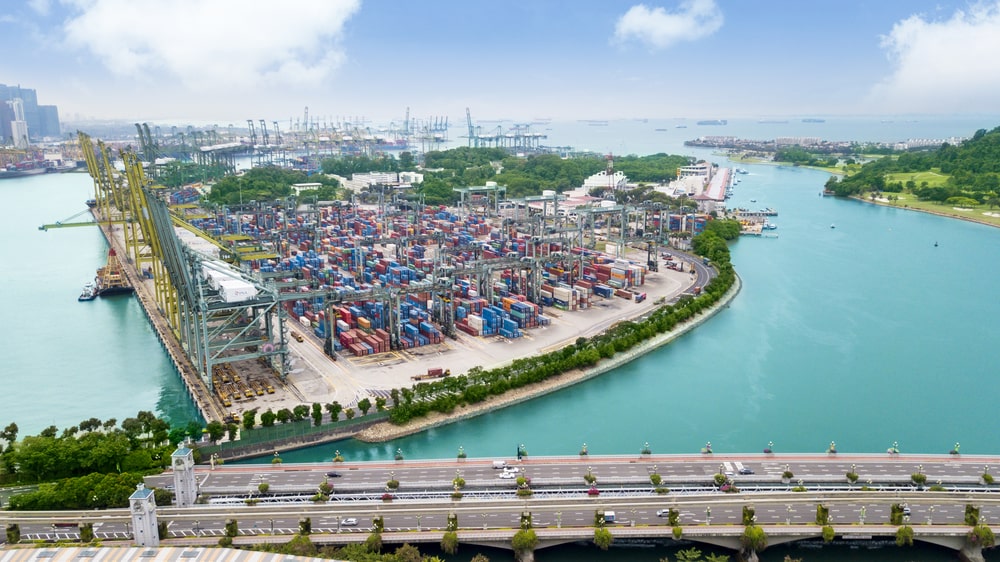Singapore is considered one of the easiest places to make business in. The ease of doing business rank is an index created by some of the top World Bank’s economists, placing this city-state in Asia on the second position worldwide, right after New Zealand.
These ranks use various factors, such as the amount and complexity of required documents, incurred costs, tariffs and time needed to import and export from the country.
Given the particular size and geography of Singapore, the mighty Asian city-state that doesn't have much space for industry or agriculture and food production, the bulk of its economy consists of goods that are imported to Singapore to be exported further into the world. To make these trading operations easier, Narvi developed a borderless payment infrastructure that helps exporters in Singapore, particularly those working with clients and businesses in Europe.
However, many exporters still face European banking inefficiencies in international trade, such as delayed settlements, high compliance costs, and inconsistent payment infrastructure across member states. Narvi helps bridge these gaps by offering seamless digital solutions that bypass traditional bottlenecks.
Narvi’s solution includes a European IBAN account that drastically cuts transaction time and costs, enabling businesses to send and receive SEPA payments almost instantly — with no hidden fees. This is coupled with highly competitive FX services and transparent transfer pricing that gives companies a clear financial edge.
These features are especially valuable as currency exchange solutions for the shipping industry, where tight margins and fluctuating forex rates can significantly impact profitability on each shipment.
B2B exports from Singapore into Europe
Singapore, with its strategic position in Asia and a modern harbour, is home to one of the top 3 busiest ports in the world, and 7th of the most strategic airports. The infrastructure of the city makes transport of goods between continents particularly easy. It’s partners in the region: Malaysia, Indonesia, and the Philippines, export mostly raw materials such as rubber, palm oil, tin and petroleum. Those products are not available in Singapore in significant quantities, yet Singapore’s B2B export of them is enormous. The city-state based the bulk of its economy on re-exporting the raw goods by processing them into finished products.
Singapore is also the second largest trading partner in the Association of South East Nations (ASEAN), as of 2020, and 16th largest trade in goods partner of the European Union. The biggest European importers from Singapore are the Netherlands, Belgium and Germany, while the biggest exporters are France, Netherlands and Germany.
According to the data collated by the Eurostat, the top five items/category of goods traded between the EU and Singapore in 2020 were:
- Medicaments, health care products
- Electronic tubes, valves and related items
- Medicinal and pharmaceutical products
- Organic, inorganic and related compounds
- Measuring instruments, etc.
Source: Eurostat
Legal basis for trading between Europe to Singapore
Among important milestones in relations between the EU and Singapore were trade and investment protection agreements, signed on 19 October 2018 and which entered into force on 21 November 2019 - first bilateral agreement between EU and an ASEAN partner.
This agreement affects all major areas of trade and cooperation and sets preferential conditions for trading partners, aims to create new opportunities and a level playing field for companies from the EU and Singapore through increasing market access. It does so by reducing technical barriers to trade, removing obstacles to trade and investment in green technologies and by fostering green public tendering and creating new opportunities in environmental service.
On top of that, it also creates a segway for companies to establish their commercial presence abroad and access new markets, notably for many non-services sectors such as manufacturing. Partners agreed to replace all previously existing bilateral investment treaties between EU Member States (now excluding the United Kingdom) and Singapore, and with it gave way to a single set of rules, agreed upon tariff levels and standards for protection of all investments between the EU and its Member States, and Singapore.
How to prepare for trading with Singapore?
In order to begin trading in Singapore, the entity must be registered with the Accounting and Corporate Regulatory Authority (ACRA) — the national regulator of businesses in the country. Each registered company gets a Unique Entity Number (UEN), used by all entities in the country and used to identify a company by governmental agencies.
Importing goods into Singapore
If you work as an importer, your company will need to determine if any duty or Goods and Sales Tax (GST) payments are required on the specific products originating from Singapore, and vice versa, and report the goods you're trading (whether duty free or not) to the Customs. Before you start shipping any goods, make sure your Customs account is active.
According to the bilateral agreement, in 2022 the ratio of goods exempt from any customs and duties will reach 90% of everything that’s traded between countries.
The list of items and categories of goods that are banned from trading can be found on the Singapore Customs website here. Exporters do not have to pay any local taxes (GST) or Customs duty on goods sent abroad from Singapore.

Importing and exporting goods into Singapore
As an importer, the company will need to determine if duty or Goods and Sales Tax (GST) payments are required on the products they are importing. There is also a Temporary Import Scheme in place, which suspends taxes and duties on certain goods. Everything about that particular solution can be found under the enclosed link.
Exporters must remember to declare the goods to Singapore Customs - some of the items are subject to permits granted by the Customs, especially for goods that are intended for re-importing, re-exported under the Temporary Import Scheme, as well as locally manufactured goods and local GST-subject products.
Transshipping goods
Transshipment is one of the pillars of Singapore’s trade and economy. It involves goods arriving in Singapore as their first or intermediate destination and then being shipped out to their final destination. Transshipping occurs when goods are transferred from one mode of transportation to another (e.g. from a lorry carrying to a ship, or when smaller packages are packed into a single large consignment) between the place of origin and the final market.
In 2021, Singapore is named as the number one port for transshipping worldwide, accounting for a whooping figure of 20 percent of the world’s transshipment volumes. Since goods arriving for transshipment are not considered imported items by Singapore Customs, transhipment of goods is not subject to duty or Goods and Services Tax (GST).
Some of the conditions for transshipping through Singapore:
- Licence is required for Controlled goods.
- Strategic goods, especially munitions or bio-chemicals, are subject to more stringent requirements and special permits.
- Non-controlled goods do not require licenses.
- You may be required to obtain Furnish Security for dutiable goods such as alcohol, cigarettes or motor vehicles in the form of a Banker’s Guarantee or Insurance Bond.
- Apply for Transshipment Permit from Singapore Customs and prepare documentation for clearance of cargo.
For more information on transshipping via Singapore visit consult the government’s page.
Legal Requirements to export goods into the EU
The following procedures/regulations need to be complied with before a Singaporean exporter can start sending their goods into the European Union:
- The first time a Singaporean company makes any customs declaration to export a product into the EU, the company will be given an EORI (Economic Operator Registration and Identification). This is a unique identifier for use by Customs Authorities in the EU for anyone exporting or importing goods into the EU. The EORI must be used in all communications with any of the EU’s Customs Authority for the purpose of exporting or importing from and to the EU.
- Another requirement is the Entry Summary Declaration (ENS), which contains information about the consignments entering the EU. This must also be obtained in advance of the goods arriving at the first port in the EU where the vessel transporting the goods crosses into EU territory.
For information about registering a company in Singapore, read this article. If you want to open a Singaporean or international bank account, we have an article for you about it here.
There are different deadlines for submitting the ENS to Customs. The deadlines are based upon the type of vessel transporting the goods into the EU. For more tips on EU imports requirements visit the European Commission website.
B2B exporters: Simple, fast and low-cost international financial transactions with B2B Pay
B2B Exporters: Borderless, fast, and cost-effective financial infrastructure with Narvi
For exporters in Singapore and across Southeast Asia, efficient access to Europe’s financial system can be a competitive advantage — or a major bottleneck.
That’s where Narvi comes in.
Narvi is a next-generation B2B payment solution designed to eliminate the friction of cross-border trade — especially between Asia and Europe. Whether you're exporting pharmaceutical goods, high-tech components, or reprocessed raw materials, Narvi helps you move money seamlessly and stay compliant with evolving financial regulations.
Unlike traditional banks that often delay settlements and charge opaque fees, Narvi gives your business access to a digital-first, transparent, and borderless financial experience.
Here’s how your business benefits with Narvi:
- European IBAN accounts. Open EUR-denominated accounts to send and receive SEPA payments — fast, reliably, and without the burden of SWIFT fees. Same-day processing is standard.
- Multi-currency infrastructure. Narvi supports 30+ currencies, enabling you to receive payments in your customer’s local currency while reducing conversion losses and FX risk.
- Transparent FX and competitive rates. No hidden spreads or surprise markups. Narvi offers real-time FX quotes and ensures your margins stay protected — especially crucial in tight-margin industries like shipping and re-exports.
- Live transaction tracking & robust security. Stay in control with real-time visibility of incoming and outgoing payments, backed by enterprise-grade compliance, encryption, and fraud prevention systems.
Whether you’re shipping finished electronics from Singapore to Belgium, or managing high-volume payments across your Southeast Asian supply chain, Narvi gives you the financial infrastructure to trade globally without borders.
Get started with Narvi today — and build your business on a foundation made for global scale.
Page content
About the author

Disclaimer
This publication is provided for general information purposes and does not constitute legal, tax, or other professional advice from B2B Trade Payment Services AB or its affiliates, and it is not intended as a substitute for obtaining advice from a financial advisor or any other professional.
